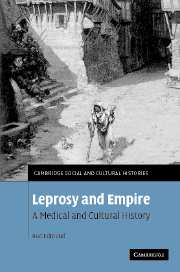Book contents
- Frontmatter
- Contents
- List of illustrations
- Acknowledgements
- Introduction
- 1 Describing, imagining and defining leprosy, 1770–1867
- 2 Scientists discuss the causes of leprosy, and the disease becomes a public issue in Britain and its empire, 1867–1898
- 3 The fear of degeneration: leprosy in the tropics and the metropolis at the fin de siècle
- 4 Segregation in the high imperial era: island leper colonies on Hawaii, at the Cape, in Australia and New Zealand
- 5 Concentrating and isolating racialised others, the diseased and the deviant: the idea of the colony in the later nineteenth and early twentieth centuries
- 6 Writers visiting leper colonies: Charles Warren Stoddard, Robert Louis Stevenson, Jack London, Graham Greene and Paul Theroux
- Postscript
- Index
2 - Scientists discuss the causes of leprosy, and the disease becomes a public issue in Britain and its empire, 1867–1898
Published online by Cambridge University Press: 17 July 2009
- Frontmatter
- Contents
- List of illustrations
- Acknowledgements
- Introduction
- 1 Describing, imagining and defining leprosy, 1770–1867
- 2 Scientists discuss the causes of leprosy, and the disease becomes a public issue in Britain and its empire, 1867–1898
- 3 The fear of degeneration: leprosy in the tropics and the metropolis at the fin de siècle
- 4 Segregation in the high imperial era: island leper colonies on Hawaii, at the Cape, in Australia and New Zealand
- 5 Concentrating and isolating racialised others, the diseased and the deviant: the idea of the colony in the later nineteenth and early twentieth centuries
- 6 Writers visiting leper colonies: Charles Warren Stoddard, Robert Louis Stevenson, Jack London, Graham Greene and Paul Theroux
- Postscript
- Index
Summary
Milroy in the West Indies
The Royal College of Physicians' Report on Leprosy 1867 was based on information gathered across the empire as interpreted by advanced metropolitan thinking on leprosy in particular and disease in general. Its findings, however, made little difference to how the disease was regarded in most colonial territories. In the West Indies particularly its conclusions were ignored or resisted, and in the decade following the report Milroy was frequently called upon to endorse and restate its findings.
The most common challenge to the report came in the form of claims to have found a cure for the disease. Having declared that leprosy was non-infectious, the College of Physicians was bound to regard such claims with deep scepticism. In the years following the Report local remedies such as gurjun and cashew nut oil were often suggested to the Colonial Office from various colonial territories. These would be passed on to Milroy, who was consistently dismissive of such claims. As he wrote to the Colonial Office in 1878: ‘It is vain to look for any permanent benefit from empirical medicaments in a bad form of Cachexia, or chronic malady connected with constitutional depravation. Unhappily, the public is, every now and then, being misled by the announcements of specific remedies which are speedily found to be utterly fallacious, if not also positively mischievous.’ One such claim, a decade earlier, had taken Milroy to the West Indies.
- Type
- Chapter
- Information
- Leprosy and EmpireA Medical and Cultural History, pp. 61 - 109Publisher: Cambridge University PressPrint publication year: 2006



